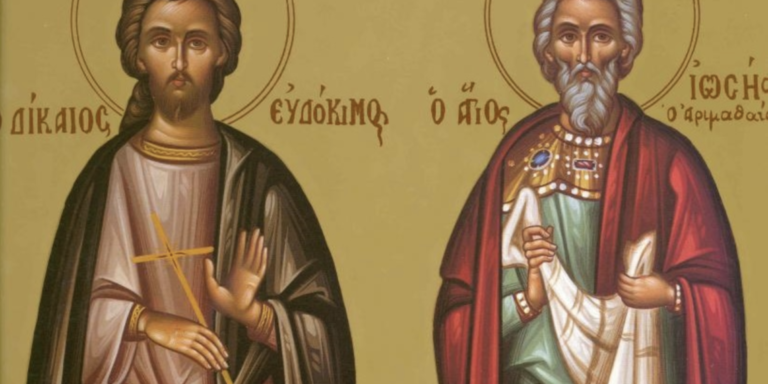Saint Eudocimus, a native of Cappadocia (Asia Minor), lived during the ninth century during the reign of Emperor Theophilus (829-842). He was the son of the pious Christians Basil and Eudokia, an illustrious family known to the emperor. They raised their son “in discipline and admonition of the Lord” (Eph. 6: 4), planting in his soul a sincere faith and holy virtues.
The righteous life of Saint Eudocimus was devoted to pleasing God and serving his neighbor. Having given a vow to remain unmarried and chaste, he avoided conversation with women and did not look at them. He would speak only with his own mother, whom he greatly respected. The emperor valued his virtue and talents, so he appointed Saint Eudocimus as governor of Chorziane, Armenia. Fulfilling his duty as a servant of God, Saint Eudocimus governed the people justly and with kindness. He concerned himself with the unfortunate, and with orphans and widows, and he was a defender of the common people. His personal Christian exploits which he did in secret, were known only to God.
Eudocimus pleased God by his blameless life, and the Lord called him at age 33. Lying on his deathbed, Saint Eudocimus gave final instructions to place him in the grave in those clothes in which he would meet death. Then he sent everyone out of the room and entreated the Lord that no one would see his end, just as no one saw his secret efforts during life. His attendants buried him as he had instructed them. Right after the death of Saint Eudocimus miracles took place at his grave. Many sick people were healed, and the news of the miraculous healings spread.
After 18 months, the mother of Saint Eudocimus came from Constantinople to venerate his relics. She gave orders to remove the stone, dig up the ground, and open the grave. Everyone beheld the face of the saint, bright as if alive, altogether untouched by decay. A great fragrance came from him. They took up the coffin with the relics from the earth, and they dressed the saint in new clothes. His mother wanted to take the relics of her son to Constantinople, but the Kharsian people would not clear a path for their holy one. After a certain time the hieromonk Joseph, having lived and served at the grave of the saint, transported the relics of Saint Eudocimus to Constantinople. There they were placed in a silver reliquary in the church of the Most Holy Theotokos, built by the parents of the saint.

